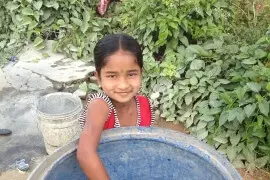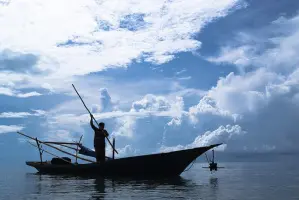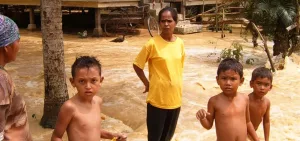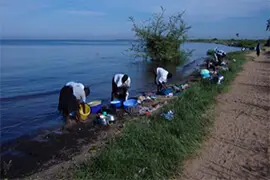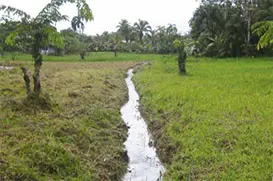heading
PROJECT: UNDP-SIWI WATER GOVERNANCE FACILITYHuman Rights
Natural resources, including water in river basins, groundwater aquifers and seas, are important to, and exploited for, human wellbeing. Freshwater scarcity and pollution threaten the human rights to achieve an adequate standard of living, safe drinking water and sanitation, and many other rights. Governance and management of our shared water resources are necessary to secure the realization of human rights.

Water is a natural resource of critical importance for human dignity and health, a decent standard of living, development, food, livelihood, subsistence, work, education, self-determination, and culture. All these aspects of life are human rights, acknowledged under international human rights law. They apply alongside the human rights to (safe and clean drinking) water and adequate sanitation, commonly abbreviated as HRWS, and formally recognized under the UN system in 2010.
In essence, human rights protect the inherent dignity of every human being, and they are therefore central in our strive for a water wise world. Water and human rights also feature prominently in the 2030 Agenda, along the principles and universal values Leave No One Behind and Gender Equality. Water is a blue thread throughout the 2030 Agenda, interconnecting the 17 Sustainable Development Goals. Furthermore, water is the medium through which climate change impacts people’s lives most directly, whether there is too little due to drought, too much because of extreme rains and flooding, or any other effect.
Goals
WGF mainstreams human rights and the rule of law into programmes and projects through applying a Human Rights-Based Approach (HRBA). Implementation is based on the Approach’s substantive and procedural principles and the steps that the HRBA entail, enabling us to contribute towards realizing the human rights for all. We use the Approach normatively to explain why human rights should guide programmes, projects and interventions, in advocacy and outreach activities, trainings, and advisory tasks. WGF promotes international human rights law, support governments to raise the capacity of duty-bearers, and assist organizations to empower rights-holders.
Human rights-based approach (HRBA)
The HRBA is a concept and an instrument to ensure the realization of human rights entitlements and freedoms under international human rights law. Through the HRBA, people – as rights-holders – are placed at the centre and the state is considered a duty-bearer with correlating obligations. The HRBA stresses that development cooperation assistance should be guided by certain principles and ways of working with water governance and resources management as fundaments of decision-making processes. It serves to promote procedural standards of:
- Participation and inclusion,
- Accountability, transparency, and the rule of law,
- Non-discrimination and equality,
- Empowerment and capacity building, and
- Transparency
The HRBA also provides for linkages to international and domestic law, policy frameworks such as the Agenda and its Sustainable Development Goals, and to international standards such as the Do-no-harm principle. The Universal Declaration of Human Rights, the ILO Convention No 169 on Indigenous and Tribal Peoples, the African Charter on Human and Peoples’ Rights, and the Paris Agreement are important examples of this kind of law and policy.
The HRBA stresses the importance of ensuring the entitlements of vulnerable groups in society – those who traditionally do not have strong voices and who may be disproportionally impacted by absence of development and by a lack of adequate safe drinking water and adequate sanitation services. Importantly, it calls for building of capacities of duty-bearers to respect, protect, and fulfil the human rights, for instance by allowing for inclusive and transparent processes, but also for capacitating concerned stakeholders. The HRBA also reminds of the responsibilities of non-State actors including the private sector and civil society.
A range of institutions are in place to guard the system, among them the Special Rapporteurs (for the HRWS, for human rights and the environment, and others), the Human Rights Council, the General Assembly, as well as National Human Rights Institutes/Ombudsman functions. They issue legally binding resolutions, authoritative statements and guiding documents, and can handle complaints.
Examples & lessons learned
Examples and lessons learned from projects and programmes include the following:
- In 2017, WGF co-authored a manual on the HRBA to integrated water resources management (IWRM), which brings together two fields that had previously been separate. An online course is now offered a second time together with Cap-Net, updated to also cover the Source-to-Sea (S2S) approach.
- In a Kenyan pilot project carried out in 2010 to enhance water governance using a HRBA, support was given to the government’s effort to institutionalize the right to water and see over its operation processes. As a result, Bondo villagers preserve water as a human right.
- In 2010 and 2014, projects implemented in rural Kenya by Forum Syd aimed at ‘realizing human rights to water and sanitation’ by empowering poor and marginalized communities to demand their rights. A report from 2020, Accountability in WASH: Case studies from Kenya, analyses and documents knowledge and lessons learned.
- Globally, some 2.5 billion people depend on groundwater to satisfy their daily water needs. The interface with and centrality to realize the human right to ‘safe’ drinking water are analysed in this article with recommendations on self-supply, to enable rights-holders to actively contribute to their own health and wellbeing.
- A webinar on ‘Human rights and water security in the age of uncertainty’ was organized in 2020 to commemorate the ten years anniversary of the human rights to water and sanitation, to discuss a decade of progress and setbacks, and the roles of Special Rapporteurs to further the realization of the respective rights under their mandates.
- Corruption jeopardizes the human rights to water and sanitation by obstructing access to public services. Gendered roles and responsibilities are associated with women in many societies, making them subject to diverse forms of corruption to obtain water for the household’s needs. This is explored in the report Women and corruption in the water sector.
- In this Issue Sheet of 2016, WGF outlined activities to date on the human rights to water and sanitation and the human rights-based approach.
- The water user–provider relation is important to understand from a regulatory as well as a human rights perspective, as detailed in the 2013 report Mutual Rights and Shared Responsibilities in Water Services Management, about Albania and the Philippines.
- In 2012, governments and organizations were increasingly emphasising human rights-based approaches as critical to mainstream in countries’ development policies and donor strategies. WGF Report 1 lays out the issues especially with regards to equity aspects.
More resources
Read more:
- Progress report 2010-2020 of the UN Special Rapporteur on the human rights to safe drinking water and sanitation A/HRC/45/11.
- Progressive realization of the human right to water and sanitation: The Special Rapporteur’s examination A/HRC/45/10 (2020).
- The principle of accountability in the context of the human rights to safe drinking water and sanitation: report A/73/162 (2018).
- Realizing the human rights to water and sanitation: A Handbook by the Special Rapporteur on the human rights to safe drinking water and sanitation (2014).
- Claim your water rights by lodging complaints of human rights violations to National Human Rights Institutes – read more here.
- Web page of the UN Special Rapporteur on Sustainable Environment as a Human Right.
Human rights & water
Having access to water and sanitation has been recognized as a human right since 2010. But water is also essential to ensuring the fulfilment of many other rights.
Know more about human rights & water
